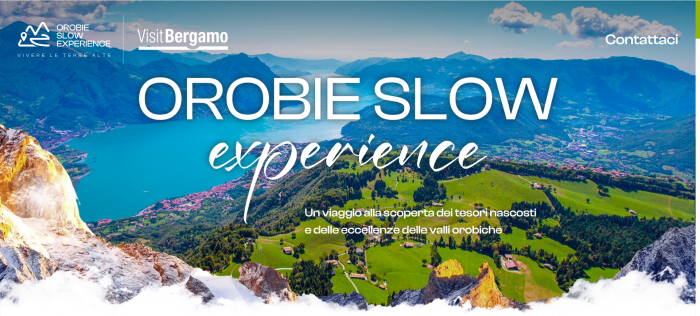
Orobie Slow Experience. Vivere le Terre Alte is a project born in the year of Bergamo Brescia - Italian Capital of Culture 2023 with the aim of creating an experiential itinerary that links the two cities, accompanying the visitor among the excellences of the Orobic valleys up to Lake Iseo.
It is a route designed with the inhabitants in order to pay homage and connect the two cities by taking the visitor to discover experiences, flavors and traditions between the mountains and the lake, developing a model of virtuous sustainable tourism capable of enhancing places, knowledge and food and wine products, through a branching of routes, from the historic centers to the valleys.
The initiative is the result of a project of the University of Bergamo, which has put in place an enlarged Triple Helix process, also involving public and private entities, associations and businesses in the area.
This is a real laboratory of territorial development in which young researchers and students of the master's degree courses in Planning and Management of Tourism Systems and Geourbanistica also participate. The intent is to generate new territorial textures in the Terre Alte between Bergamo and Brescia, pivoting on more consolidated businesses and realities, which are networked with other lesser-known realities of our Province, to strengthen their visibility and create synergies and shared planning among them, with innovative experiences between mountain and lake. (Prof. Federica Burini, scientific referent of the project)
For further information, see: https://orobieslow.visitbergamo.net/
To discover the experiences, click HERE
The research Aggiornamento della cartellonistica turistica per una Bergamo accogliente e inclusiva (Updating Tourism Signage for a Hospitable and Inclusive Bergamo) is the result of intensive co-design work involving various figures from the institutions promoting the initiative.
The objective of the research was to rethink the tourist signpost of Bergamo, including its resources, services, and city gateways, in an inclusive manner by devising a research methodology that leads to an understanding of the existing signage and its enhancement through the use of georeferenced digital technologies.
Alongside the faculty members of the scientific committee of the University of Bergamo and the representatives of VisitBergamo, ATB and the Municipality of Bergamo, figures of young researchers and students from the University of Bergamo were involved, as well as a professional computer scientist.
A group of students enrolled in the second year of the Master's Degree Course in Planning and Management of Tourism Systems at the University of Bergamo took part in the research project (Fabiola Bettinazzi, Alessandra Messora, Martina Vincenti, Silvia Olivari, Vu Hai Nguyen), as part of a training placement supervised by the President of the degree course prof. Federica Burini.
In particular, students actively collaborated in the data collection and mapping of tourism signs and took part in the project's storytelling video.
The research is the result of the work carried out by a group of students enrolled in the second year of the Master's Degree Course in Planning and Management of Tourism Systems at the University of Bergamo (Mia Agostini, Ester Poma, Davide Strucek), as part of a training placement, coordinated by PromoSerio and supervised by the President of the degree course prof. Federica Burini.
The project started with an analysis of the natural and cultural resources of the valley's territory and continued with a participatory survey, aimed at understanding the itineraries and motivations of those who choose to travel over the Passo del Vivione.
The training had the twofold objective of identifying the tourism resources of Val di Scalve and analyzing the itineraries and interests of tourists in order to improve the promotion of the area. The activities were divided into several stages, namely:
In addition to illustrating the methodology followed and the data collected, the final report presents a reflection on the motivations of tourists in their passage through the Passo del Vivione and on how it is possible to improve the tourist promotion of the area. The methodology in fact envisaged a field survey divided into a number of main phases:
The key elements of the survey include information on the tourist's profile (nationality, age of the tourists, means of transport used, etc.), the itinerary (places visited, accommodation, roads chosen), opportunities and criticalities of their experience in the destination. Specifically, the survey was addressed to:
The research project linked to sustainable tourism in the High Land of Lake Iseo (Terre Alte del Sebino) is divided into three phases and was carried out with the scientific support of Professor Federica Burini of the University of Bergamo, some students of the master's degree course in Planning and Management of Tourism Systems and with the collaboration of technician and local expert.
The first phase of the project, entitled Bossico: dal paesaggio morenico al panorama lacuale per un turismo s-Low, was carried out in the period 2016/2017 and the object of study was the territory of Bossico and the population. During the research, the knowledge and traditions together with the production activities and specificities of the territory were investigated.
The second phase was carried out through the project Dal paesaggio morenico al paesaggio lacuale delle terre alte del Sebino settentrionale: patrimonio immateriale, saperi e sapori per un turismo slow co-financed by the Lombardy Region as part of the call for proposals Invito alla presentazione di progetti di salvaguardia e valorizzazione del Patrimonio Culturale Immateriale e della lingua lombarda - Anno 2019. The project has expanded and has seen the involvement of the neighboring municipalities of the Terre Alte del Sebino Settentrionale.
The third phase started in September 2020 through the implementation of the project Nuove economie di comunità – proposte di turismo sostenibile delle Terre Alte del Sebino settentrionale, co-financed by the Fondazione Istituti Educativi Bergamaschi and by the municipalities.
The results of the work carried out have been reported in the research reports and can be consulted on the dedicated website: https://www.terrealtedelsebino.it/